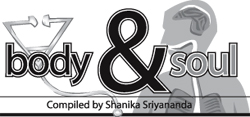|
 | |
[email protected]
Patient-doctor dialogue vital
by Dr. Remy Perumal, Consultant in Acute
Medicine,East Surrey Hospital, Redhill, Surrey, UK
Therapeutic value of talking with patients has been well recognised
since the time of Hippocrates. Because the physician's words can have a
major impact on the patients experience of illness, much of the good or
harm that is done in medical care, depends on the style and content of
the physician's communication.
 Good communication skills therefore, provide the cornerstone of a
satisfying and fruitful consultation for both clinician and patient. Good communication skills therefore, provide the cornerstone of a
satisfying and fruitful consultation for both clinician and patient.
Medical Interview
To practise clinical medicine today, whether, in developing countries
or in the developed world, clinicians need excellent communication
skills and a correct attitude and the ability to relate to patients.
Good medicine is not only the practice of science, but also the
practice of humanities; and central to the humanitarian practice of
medicine is the development of good communication skills. Central to the
development of good communication skills is the development of empathy.
To emphasise, health professionals need to know how to deal with
patients sympathetically and without condescension.
Medical interviewing is a core clinical skill. It is the mechanism of
doctor-patient communication, the most single important source of
diagnostic data, and the means through which we gain the patient's
confidence and elicit the patient's participation in the process of
care.
This core clinical skill has now become complex and important, as it
influences communication effectiveness, data accuracy, clinical decision
making, ethical decision making, compliance, patient satisfaction,
clinician satisfaction and clinical outcomes.
Ethical issues
Even experienced clinicians will acknowledge that, there are clinical
situations which require care, diplomacy and sensitivity - e.g. breaking
bad news, whether, it be informing the patient of a terminal illness or
explaining complex ethical issues e.g. end of life decisions.
Acceding to family requests, on withdrawing treatment and at the same
time avoiding breaking the law, could present a challenge, even to the
articulate clinician.
Problems of ethics and communication are intertwined. Ethical issues,
such as informed consent, truth telling and confidentiality arise
frequently in the doctor-patient relationship.
Successfully addressing these requires skills in ethical analysis and
communication.
Physicians often justify making healthcare decisions for patients on
the grounds that the physician is more qualified to decide which
treatment plan best promotes the patient's health. However, patient
participation in clinical decisions, rather than unbridled physician
paternalism is justified in the ethical principle of Beneficence.
It means taking into account the patients view of their best interest
as well as their medical best interest.
In the western world, growing medical litigation is a major cause for
concern. In the United Kingdom, each year the Medical Protection Society
receives about 20,000 requests for assistance from doctors, who are the
subject of a complaint, an investigation or are involved in a claim or
other medico legal advice.
Avoiding complaints
There is a growing body of international evidence that, the better
doctors communicate with their patients, fewer the number of complaints
and claims made against them. Conversely, doctors who relate poorly with
their patients, attract higher than average claims and complaints
regardless of their clinical/technical ability.
In conclusion, good communication skills are paramount in medical
encounters, whether the goal is to obtain accurate information, convey a
serious diagnosis, help a patient consider alternative treatment plans
or provide reassurance to a frightened patient.
Communication skills is essential learning for all healthcare
professionals. For the clinician practising medicine today, good
communication skills are a required need, to create positive patient
relationships, to facilitate patient centred treatment decisions and to
achieve better treatment outcomes, through team work and increased
patient participation.
It helps to create immediate rapport, trust and empathy with
patients, leading to clearer understanding of patient's priorities. It
can also help limit complaints against clinicians and may reduce medical
negligence claims.
Medical schools, academic colleges and medical specialist societies
must have mechanisms in place, for Undergraduates and Postgraduates to
acquire and continue to improve their skills to communicate effectively
with patients, in the well informed and demanding, modern society.
Fight the need to sleep, and sleep
Wouldn't it be nice to curl up and take a nap right now? About twenty
million insomniacs pace the halls each night, but it's difficult to
assess how many people suffer from excessive daytime sleepiness, known
as hypersomnia.
 The National Sleep Foundation estimates that up to 40 percent of
Americans have at least some of the condition's symptoms some of the
time. Its consequences are worse than decreased productivity: Fatigue
causes at least 100,000 car accidents per year, estimates the U.S.
National Highway Traffic Safety Administration. The National Sleep Foundation estimates that up to 40 percent of
Americans have at least some of the condition's symptoms some of the
time. Its consequences are worse than decreased productivity: Fatigue
causes at least 100,000 car accidents per year, estimates the U.S.
National Highway Traffic Safety Administration.
Mass drowsiness can't be pinned on any one culprit. "Sleep lives at
the nexus of our social life, biology, and behaviour," says James Wyatt,
director of the Sleep Disorders Service and Research Centre at Rush
University Medical Centre in Chicago.
Wyatt and his colleagues send patients an eight-page questionnaire
and meet with them for an hour before arriving at even a preliminary
diagnosis. "We're not looking for the smoking gun, we're looking for all
the indicators... it could be a biological sleep disorder, it could be a
medication you are taking, and it could also be that you live near an
airport or sleep with a noisy pet.
Hypersomnia is not merely feeling tired after a late night out. It's
a stronger, more consistent sleepiness that compels you to nap, even at
inappropriate times. See your primary care physician if you have a
particularly hard time waking up, if you are especially anxious and
irritable, and/or if you've lost your appetite. Unsurprisingly,
excessive daytime sleepiness can cloud your thinking and mar your memory
or even spur hallucinations.
Sleepy sources
You can make yourself sleepy by repeatedly staying up. But
narcolepsy, a neurological condition marked by uncontrollable urges to
sleep, or sleep apnea, which causes interrupted breathing during sleep,
are involuntary potential root causes.
Factors that bring on hypersomnia (separately or in combination) also
include depression or bipolar disorder, the use of prescription
medicines, drug or alcohol abuse, a head injury, and a genetic
predisposition toward drowsiness.
Wake-up calls
Hypersomnia can indeed be treated. Once a doctor determines what is
causing your sleepiness, he or she would treat a primary sleep disorder
first. Sufferers of sleep apnea, for example, may be advised to use a
CPAP (continuous positive airway pressure) device, a mask attached to a
machine that blows air to keep nasal passages open during the night.
Antidepressants could be prescribed if your doctor believes depression,
anxiety, or bipolar disorder is causing your excessive sleepiness.
Stimulants are also a common treatment for hypersomnia?and new drugs
such as modafinal are thought not to be habit-forming. Exposure to
artificial bright light in the morning can help reset your body's
internal clock. Your doctor may advise you to cut down on your drug,
alcohol and caffeine, or may use cognitive-behavioral therapy techniques
to help you establish a more consistent sleep routine.
Sweet dreams
You've heard some of these sleep hygiene tips before, no doubt, but
incorporating them requires not just knowledge but self-discipline. Try
keeping a sleep diary each day to hold yourself accountable as you
develop better habits.
Most importantly, go to bed and wake up at set times. Try to exercise
for at least 20 minutes, preferably five to six hours before bedtime.
Establish a relaxing nighttime ritual such as taking a warm bath or
reading, avoid watching TV or surfing the Internet too late as those
images will get your mind racing when it should be settling down.
PsychologyToday.com
Vegetarians are not prone to anaemia
by D. P. Atukorale
 Anaemia means "lack of blood" and in patients with anaemia there is a
reduction in the oxygen-carrying capacity of the blood which can be
caused in three main ways Anaemia means "lack of blood" and in patients with anaemia there is a
reduction in the oxygen-carrying capacity of the blood which can be
caused in three main ways
(a) loss of blood eg. due to piles, heavy menstrual flow or gastric
and duodenal ulcers or hook worms infection
(b) excess red cell destruction as in haemolytic anaemias; and
(c) defective red blood formation eg. iron deficiency anaemia.
There are many types of anaemia but the commonest type of anaemia we
encounter in our clinical practice is iron deficiency anaemia which is
mainly a nutritional problem.
There is a misconception among non-vegetarians that anaemia is common
among vegetarians. You may be surprised to know that despite the meat
industry propaganda, that a healthy vegetarian diet is an excellent way
to get all the iron, and vitamins such as folic acid and vitamin C you
need.
Iron deficiency anaemia is a common problem among Sri Lankans both
among meat eaters and vegetarians. Iron deficiency anaemia is more
widespread among women (before menopause) than among men, and excessive
bleeding during menstrual periods is very common among women.
Other animals such as chimpanzees and monkeys (who eat vegetarian
diet) don't get anaemia. Vegetarian and vegan (pure vegetarian) diet is
well capable of providing normal iron requirements which are normally
obtained from dark green leafy vegetables (such as Gotukola, Niwithi),
soya products and whole grain.
Recent scientific evidence reveals that over-consumption of iron rich
foods such as red meat may be a health hazard and people with high
levels of serum iron and serum ferritin are prone to heart attacks.
There are a large number of research studies such as British
Vegetarian Study, The British Vegan Report, studies done in Israel,
Netherlands, Sweden, Canada and China comparing haemoglobin (Hb) levels
of vegetarians and meat eaters to show that vegetarians are not prone to
anaemia. The Chinese study which involved 6500 vegetarians showed that
meat eating is by no means necessary to prevent iron deficiency anaemia.
The American Dietic Association has concluded that with vegetarian
and non-vegetarian diet iron and folate supplements are usually
necessary during pregnancy although vegetarians frequently have greater
intake of those nutrients than do non-vegetarians. All the research
studies disprove the fallacy that a meat-free diet can't provide enough
iron. It certainly can.
Other dietary anaemias
Besides iron, folic acid (vitamin B9) and vitamin B12 play an
essential part in the formation of haemoglobin in the blood. Folic acid
deficiency is widespread globally and unlike iron and other vitamins
such as B12, body does not store folic acid.
The good news for vegetarians is that folic acid is present in many
common green leafy vegetables and folic acid is not present in most
meat, fish, milk and root vegetables.
For all practical purposes folic acid deficiency anaemia does not
occur in vegetarians although folic acid is given to both vegetarians
and non-vegetarians during pregnancy to prevent neural tube defects in
the foetus.
Lecto-vegetarians
Majority of Sri Lankan vegetarians consume milk, curd and milk
products that contain vitamin B12. The amount of B12 needed in the diet
is 1.0 micrograms (one million of a gram) per day. As far as I am aware
B12 deficiency has not been documented in Sri Lankan vegetarians (both
vegans and lacto-vegetarians).
B12 is almost always manufactured by bacteria in our gut, mouth
(around gums) nasal passages and around tonsils which may produce B12.
But it is advisable for vegans to take a vitamin B-complex tablet
containing B12 periodically. It is noteworthy that most of the vitamin
B-complex capsules and tablets contain B12.
Majority of laymen, some doctors and dietitians both in Sri Lanka and
abroad believe that vegetarians are likely to be anaemic and these
fallacies, like other folklore are passed down from one generation of
practitioners to another because they sound plausible because no one
bothers to check or question the original research in the field and if
they do, they would be in for quite a shock.
A computer search reveals that in the period 1966 to 1994 a total of
7,618,328 major medical journals (Medline database published in US
National Library of Medicine) were published.
Of these just 62 mentioned the word anaemia in connection with the
word vegetarian or vegan and most of the 62 reports dealt with iron
deficiency anaemia due to poverty.
That is just under 0.000814 per cent of medical literature in 28
years. Not very much is it?
As mentioned earlier that vegetarians are prone to anaemia is a
common myth among Sri Lankan (laymen, dietitians and doctors).
In any middle aged or elderly person with anaemia due to vegetarian
diet an underlying disease such as cancer, haemorrhoids, peptic ulcer or
hookworm infestation etc should be excluded.
Plant-based foods are superior to meat-based ones because they
furnish us all the iron (and other vitamins) and protect us from health
hazards associated with iron overload. |
